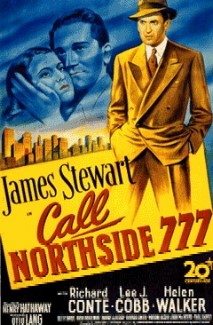Call Northside 777
 Call Northside 777 was released by Fox in 1948. Directed by Henry Hathaway, it is based on a real case in which an innocent man was imprisoned for killing a cop during the wild days of prohibition in Chicago. A reporter, assigned to a human interest story when the man's mother places a classified ad looking for information, eventually digs up the evidence to clear him.
Call Northside 777 was released by Fox in 1948. Directed by Henry Hathaway, it is based on a real case in which an innocent man was imprisoned for killing a cop during the wild days of prohibition in Chicago. A reporter, assigned to a human interest story when the man's mother places a classified ad looking for information, eventually digs up the evidence to clear him.The DVD of this film is included in the Fox Noir series, but there's debate on whether this film is really noir. It's more of a procedural--not a police procedural, but a journalistic one. It's also more of a docudrama in that regard, as much of the action is taken up with the reporter (played by James Stewart) chasing down leads. Aside from the cop's murder, which is shown in the opening moments of the film, there is no violence at all. At one point a man holds a gun on Stewart for a moment, but the gunman's wife yells at him and he lowers it.
This film has a pretty solid reputation, but I found it a bit dull. It seems to be fascinated with gadgets that must have been new on the scene. There is a long sequence with a lie detector machine, including painstaking exposition on how it works. The final bit of evidence comes in via a wireservice photo, and the machinery for that bit of technological legerdemain is shown in detail.
More interesting is that the corruption of the Chicago police during the roaring twenties is stated plainly. A few lines of dialogue bend over backwards to indicate that the contemporary force is upstanding and clean, but this film clearly establishes a line of contention between the press on one side and the forces of law and order on the other, and the press are the good guys.
Stewart, as usual, is terrific. This would begin a period where his gee-whiz persona would start to change, as his reporter character is highly cynical and hard-boiled at the start, but gradually comes to believe in the innocence of the man in question. By the fifties, Stewart would be playing some funky, psychologically developed characters.


Comments
Post a Comment